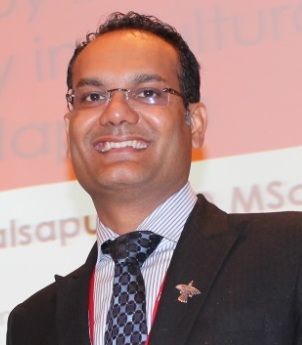|
VII CONGRESO
INTERNACIONAL y XII NACIONAL de
PSICOLOGÍA CLÍNICA SEVILLA,
14-16 de NOVIEMBRE, 2014
|
 |
|
| Shishir Palsapure |
|
| Care
Hospital in Nagpur, India |
|
| Esañol
|
|
| MiniCV Soy psicoterapeuta y
supervisor especializado en Terapia Racional
Emotiva Conductual (TREC) y en Terapia
Cognitiva Conductual (TCC). También soy
el director del centro de formación
asociado del Instituto Albert Ellis de Nueva
York, Estados Unidos, de próxima
apertura en la India y que será
el único en toda Asia Central y
Sureste; y el director de Morphicminds, una
compañía que proporciona
formación y supervisión tanto a
los profesionales de salud mental como a la
comunidad en general. Cursé mi
educación superior en TCC y en TREC en
el Instituto Beck para la Terapia e
Investigación Cognitiva de
Philadelphia, Estados Unidos, y he sido
nombrado miembro asociado y supervisor del
Instituto Albert Ellis por el Comité
Internacional de Estándares para la
Formación de Estados Unidos.
Recientemente representé a India en la
convención anual de la
Asociación Americana de
Psicología celebrada en Hawái, y
en el Congreso Mundial de Terapeutas
Cognitivos y Conductuales celebrado en Lima,
Perú. También soy un afiliado
internacional de la APA. En los últimos
8 años, he formado a más de
5.000 profesionales, y no profesionales, de
salud mental, en cuestiones de salud mental
relacionadas principalmente con la TCC y la
TREC
|
|
| Resumen La TCC y la
TREC para la Depresión
La depresión va a ser la segunda causa de muerte después de las enfermedades cardíacas para el 2020, según la Organización Mundial de la Salud (OMS). El tratar a los pacientes con depresión puede ser un desafío para el clínico. Las terapias basadas en la evidencia como la TCC y la TREC han mostrado ser muy efectivas para la depresión leve y moderada sin medicación. Esta animada charla interactiva se centrará sobre determinados aspectos a considerar por el terapeuta, y sobre técnicas específicas o pautas generales para el tratamiento de los pacientes depresivos. El modelo cognitivo de la depresión, la conceptualización cognitiva, la triada cognitiva, las creencias irracionales y las distorsiones cognitivas son algunos de los temas que se debatirán. También se analizarán algunas técnicas cognitivas, conductuales y emotivas, como el descubrimiento guiado, la visualización, la activación conductual, etc. Los participantes aprenderán cómo modificar el pensamiento depresivo y el comportamiento de los pacientes. El formador representará también una sesión en vivo durante la conferencia. |
|
| English
|
|
| MiniBio Brief introduction: I am a
practicing Psychotherapist and Supervisor
specialized in Rational Emotive and Cognitive
Behavior therapy. I am also the director of
the upcoming Affiliated Training Center of
Albert Ellis Institute, New York, NY, USA in
India. This training center will be the only
one in central and South east Asia. I am also
the director Morphicminds, a company that
caters to the mental health professionals and
community at large in training and
supervision. I have received my higher
education in CBT and REBT at the Beck
Institute for Cognitive therapy and research,
Philadelphia, PA, USA, and have been awarded
the status of Associate Fellow and Supervisor
of the Albert Ellis Institute by the
International Training Standards Committee,
USA. I recently represented India at the
American Psychological association’s annual
convention at Hawaii, and at the World
Congress for Cognitive and Behavioral
therapists, Lima, Peru. I am also an
International Affiliate of the APA. In the
past 8 years, I have trained over 5000 mental
health professionals and non-professionals in
mental health issues, mostly CBT and REBT.
|
|
| Abstract CBT-REBT for Depression Depression will be the second
largest killer after heart disease by 2020 says
WHO. Treating patients with depression can be
challenging to the clinician. Evidence based
therapies like CBT and REBT have been shown to
be very effective in mild and moderate
depression without medication. This lively
interactive talk focuses on considerations for
the therapist, specific techniques and general
guidelines for treating depressed patients.
Cognitive model of depression, cognitive
conceptualization, cognitive triad, irrational
beliefs and cognitive distortions in Depression
are a few of the topics that will be discussed.
Various cognitive, behavioral and emotive
techniques e.g. Guided discovery, imagery,
behavioral activation etc. will be discussed.
The participants will learn how to modify
depressed thinking and behavior of the patients.
The trainer will also demonstrate a live session
during the lecture
|
|